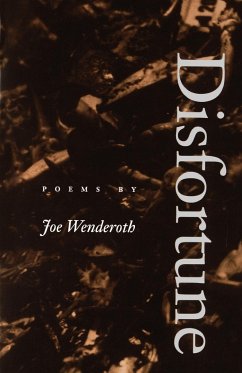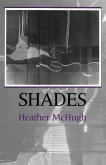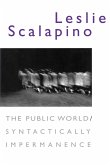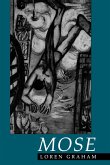Disfortune is not in the mainstream of American poetic speech, nor is it easily placed into any of the well-known poetic speech-camps that have arisen on its margins. Terse, haunting lyrics expose the irreducible contradictions of living, wherein "the talking-singing, the whole talking-/singing ball of yarn, begins to unravel." Deceptively casual in tone, these poems offer startling confrontations with "the unoriginal/oblivion," with "the contrived delicacy/of what is emptied and kept." Joe Wenderoth sees "fortune" as the mute history of events proceeding toward the ultimate security; his poems arise from "disfortune," from the need "Just to sing the song that's kept you/quiet/all this time." This book is a rare occurrence, marking not only a new intimacy with the world, but also a remembering of the determined motion of intimacy itself. JOE WENDEROTH grew up near Baltimore. He graduated with a B.A. in English/Creative Writing from Loyola College in Baltimore, attended the graduate Creative Writing program at New York University, then transferred to and received an M.F.A. from Warren Wilson College. To pay for food, shelter, and music, he has done and continues to do what he has to do. "Joe Wenderoth's brave new poetic talent is like nothing so much as a live wire writing its own epitaph in sparks. [His poems] throb brilliantly with a sense of the 'too much,' which Longinus identified with the sublime. But in Wenderoth's case the too much is the too little or the too ordinary - a very remarkable discovery to have made so late in the history of poetry. Philip Larkin and a few American poets have approached it, but Wenderoth's instrument is sharper than theirs; he makes quick cuts in the meat of the ordinary, which is the meat of the impossible." -- Calvin Bedient, Colorado Review "At times, Wenderoth's poems sound like a tougher, demotic Stevens: skewed aphorisms aimed precisely at our sense that we can be fully at ease in 'position.' In other poems, his difficulty is more like Paul Celan's. His word-play brings an image -- say, trees coming to life in spring -- half into focus, so that it remains both inner and outer, metaphysical and sexual; so that the fullest action is, once again, no action at all. An oddly active 'oblivion' is the sum of all the hurries and indifferences that make Wenderoth's world grimmer than Williams', certainly than Crane's. Yet one can't help feeling that, in a strange way, he approves of it, if only because it brings home the old Buddhist truths -- suffering, change, non-selfhood -- and thereby opens up a truly democratic compassion." -- Alan Williamson, American Poetry Review "Disfortune is a melodic and resilient book . the genuine breath and article." - Michael Burkard
Hinweis: Dieser Artikel kann nur an eine deutsche Lieferadresse ausgeliefert werden.
Hinweis: Dieser Artikel kann nur an eine deutsche Lieferadresse ausgeliefert werden.








